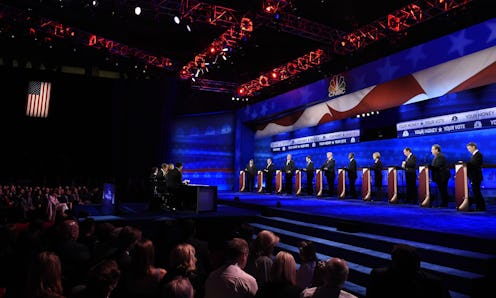News
Why Are There So Few Democratic Debates?
As the second Democratic debate nears, it has become painfully obvious just how little stage time the Democratic presidential candidates are getting in relation to their Republican counterparts. At this point, the Republicans have had four primetime showdowns, whereas the Democrats will reach just half of that time on Saturday. The discrepancy hasn't gone unnoticed by the candidates or the voters, but ultimately, the reason there are fewer Democratic debates than Republican debates could have to do with each party's respective leadership.
Republicans are expected to have more than 10 opportunities to debate one another before and during the 2016 primaries. Democrats, on the other hand, are expected to have six. These estimates account for sanctioned debates, or debates recognized and organized by the political party. It's the party's responsibility to schedule these sanctioned debates, like Tuesday night's Republican debate sponsored by Fox Business and The Wall Street Journal.
Although 10-plus primary debates may sound like a lot, it's significantly less than what the Republican Party has had in elections past. That being said, it's even more surprising that the Democratic Party would choose to limit its primary debate schedule to six dates. Yet despite calls from candidates and supporters to schedule more debates, for the Democratic Party — or its fearless leader, Democratic National Committee Chairwoman Debbie Wasserman Schultz — the plan has remained the same since spring.
In 2012, Republican primary candidates had almost 30 opportunities to debate. That high number was almost definitely overkill — as Republican National Committee Chairman Reince Priebus has worked hard to limit sanctioned debates as much as possible this time around. "I'm trying to limit the opportunity we have to kill each other," Priebus told The Washington Post. He continued:
I've always tried to be a person that sells what I control. I don't like to sell things I don't control. I don't control people's mouths, that's for sure, but what I do control is the length of time we have to kill each other.
Wasserman Schultz has also emphasized that she has control over her party's debate schedule and that she wishes to limit it severely. Candidates like Martin O'Malley and Bernie Sanders have loudly opposed the small number of debates, but Wasserman Schultz has repeatedly said that she thinks six is best:
We're going to have six debates. Period.
What's more, Wasserman Schultz isn't just limiting the number of sanctioned debates, but she's also making it harder for candidates to participate in unsanctioned debates. In the past, unsanctioned debates, those not recognized by the party, have given candidates the opportunity to challenge each other more on their own time. This time around, though, Wasserman Schultz has said that any candidate who attends an unsanctioned debate will be uninvited from further sanctioned ones.
Wasserman Schultz has given little reasoning for her firm stance. She has said that she wants to make sure "that we not let the debate process get out of control." That's a considerate stance to take on behalf of voters, but limiting candidates to six debates when, in years past, they've been able to attend upwards of 20 seems a little drastic. Some think her affiliation with frontrunner Hillary Clinton could have something to do with her firmness on the debate schedule. In 2008, she served as one of Clinton's national campaign co-chairs. Clinton had been what seemed like a shoo-in for the nomination until some attention was drawn away from her by candidates like Sanders.
Wasserman Schultz probably won't budge on the six-debate limit any time soon. In that case, voters will have to take what they can get — even if it means watching a Democratic debate on Saturday, like the second showdown, which will take place later this week.
